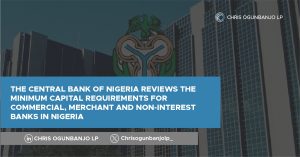The recent signing of the African Continental Free Trade Area (AfCFTA) Agreement by Nigeria has opened the doors to intra-African trade. Although the AfCFTA is expected to facilitate imports and exports among member countries – with lower or no tariffs, free access to the market and market information, we can safely posit that its impact should also be felt within the African Capital Markets.
With the elimination of trade barriers, investors are likely to flock to the African continent to establish manufacturing concerns in countries with the best infrastructure, relatively well educated middle class and one which recognizes and protects Intellectual Property Rights.
All in all, the continent is likely to witness an uptick in foreign direct investment which will have a ripple effect stimulating banking systems, leading to more investment and consumer lending. With increased business activity will come the need for capital to expand local industries and services. Tapping into the West African capital markets for funding is likely to be a veritable option to meet capital requirements. However, the difference in the regulatory frameworks of the various African capital markets makes it difficult for intra-African capital market transactions. Moreover, the lack of standardization across African countries in the listing of securities may also pose a stumbling block in encouraging cross border investment in the African capital market. Achieving regional integration will facilitate momentous growth in the markets which will empower the region to remain relevant in attracting investment flows, by creating a much larger market for local and international businesses.
This obstacle is what the West African Capital Market Integration Council (WACMIC) is seeking to surmount in the West African sub region. WACMIC was established in January 18, 2013 for the purpose of harmonizing the regulatory framework for the integration of capital markets and to facilitate ease in cross border capital market transactions in the West African Sub Region in order to help foster economic growth and development in West Africa.
To achieve its overarching objectives, WACMIC is saddled with the following functions:
- Supervision of capital market integration programmes;
- Setting up standards and validating all works done by the technical committees;
- Coordinating relevant stakeholders, such as the Economic Community of West African States (ECOWAS), the West African Monetary Institute (WAMI) and the West African Economic Monetary Union (WAEMU);
- Monitoring and assessing the state of preparedness of the member States in the integration process;
- Sourcing funds and other resources for the implementation of capital market integration; and,
- Monitoring standards and compliance of post-integration.
How can you benefit from the opportunities that WACMIC presents?
We note that the roadmap for the integration of West African Capital Markets is planned to occur in three (3) phases:
Phase 1 – Trading among WACMIC members via sponsored access. (Physical phase) Learning from this phase will inform the next phase.
Phase 2 – Introduce ‘membership’ privileges, e.g., electronic membership. (Logical phase)
Phase 3 – Full integration, i.e., all markets accessible by qualified West African brokers.
WACMIC has already successfully completed its first direct trade between Nigeria and Ghana under Phase 1 of its integration programme to promote trade across member countries. The benefits of this integration will not just stop at aiding the ease of capital movements but also in creating untapped avenues for issuers who seek to raise capital and investors in search of investment opportunities in the West African region. Considering the increase in intra-African trade that AfCFTA is expected to bring about, there will be a similar boost in investment in businesses across the West African sub region. We believe that WACMIC’s framework and standardization and harmonization activities should complement the objectives of AfCTA as it would serve to ensure easy and speedy trades within the various capital markets in the region, whilst cross border listings, trading and settlement should ultimately be achieved seamlessly on any of the West African stock exchanges.
For further information and detailed advice, please contact the following lawyers in our Capital Markets group:
Ms. Simisola Eyisanmi
Ms. Jane Odili



